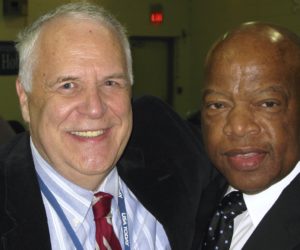
John Lewis crossed that bridge in Selma, Alabama, when I was in high school next door in Georgia. Like most of America, I learned who he was when legendary CBS anchorman Walter Cronkite told us and showed those awful, brutal, bloody pictures — images that would ignite a fire that changed the country. John knew state troopers were waiting on the 600 matchers, but he would not be moved. In the words of the young folks nowadays, this Georgia kid thought John was “badass.”
Fast forward to 1980 where as a columnist for the morning newspaper, The Atlanta Constitution, I got into a fight with the billboard industry that wanted to cut trees planted by civic groups so their eye pollution could be better seen. Atlanta politicians were ragging on me at a City Council meeting – “You’ll be known in history as the man who defended the trees”—when Councilman Lewis approached, listened to their harassment, then in his soft-spoken voice told them, “I like trees.” They shut up.
I introduced myself – ‘No need,” he said, “I love your column.” And thus, began a friendship of 40 years. When I got back to my office it hit me. Good grief, John Lewis was defending me.
“Do not get lost in a sea of despair. Do not become bitter or hostile. Be hopeful. Be optimistic.”
When he decided to run for Congress mutual friends who supported his effort tried to convince me to join the effort as spokesman. I thought as a journalist I would do a better job of spreading the word of his good work. He became my Congressman. Not all his fights were on the national stage.
Atlanta is a city of communities, most of them highly competitive with each other. They came together one time. There was a plan to put a multi-lane road through the area, destroying historic neighborhoods. The locals called on their Congressman for help. He responded, not by legislation or Washington influence but by showing communities how to peacefully resist – “good trouble,” he called it. It was amazing to see, middle aged white people chaining themselves to trees. They killed the road and part of where it would have gone is a sculpture in John’s honor. Visitors to Atlanta need to see it.
I want to see young people in America feel the spirit of the 1960s and find a way to get in the way. To find a way to get in trouble. Good trouble, necessary trouble.
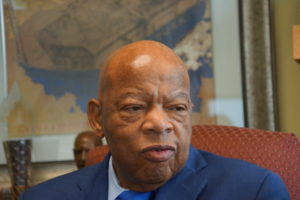
John loved kids and telling them about the civil rights struggle. He co-wrote a trilogy of comic books called “The March” for young folks. The grandson of Sandy McClure, co-author of “The Soprano State” was a huge fan. Sandy asked me if I could ask John to sign it. When we got our schedules together in Atlanta I didn’t have the boy’s book, so I ran out to buy another and the only thing they had was the trilogy. A black friend asked if she could come along and bring her grandson, who she took out of school for the occasion. It was a great day, John told him about the movement. He signed books for the boys. He noticed I had an extra. He took it and wrote “To Bob Ingle: Never stop fighting the fight for justice for everyone.”
He loved to tell the story of how he wanted to be a minister and as a kid in Troy, Ala., he practiced preaching – to the chickens. As an inside joke we took to his office fresh eggs from a friend’s Atlanta henhouse. He accepted with a big smile. He never forgot where he came from: the son of cotton share-croppers whose grandfather was born into slavery. He kept the farm. His name was John Robert Lewis but Dr. Martin Luther King Jr. called him “the boy from Troy” after he wrote a letter asking for help because his town library would not lend books to black folks.
“You must be prepared if you believe in something. If you believe in something, you have to go for it. As individuals, we may not live to see the end.”
When he did interviewers for NBC, MSNBC, ABC, PBS, NPR, Washington Post, New York Times and the others you might get the impression he always was solemn and serious. Not true. He was the humble, honest, sincere, kind, gentle man you saw. Nothing phony about him. But he also was a man who had likes, dislikes and a sense of humor. I was at the bridge in Selma once when the only other people there were a black man who just retired from a military career and his son who just graduated from college. He and the son were on a heritage tour. We talked and I mentioned John is a friend and whenever I am in the area I cross the bridge. He called his son over and told them with great excitement, “Get a picture of me and this man. He is a friend of John Lewis.” I told John, “Thanks to you, I am a star.” He laughed out loud. Civil rights legend and former Atlanta Mayor Andrew Young said John could tell you to go to hell in such a way you would almost enjoy the trip. John would come into his office suite, grab a bag of candy from the basket for visitors at the door, toss it over an office wall then come in as if he had no idea anything had happened.
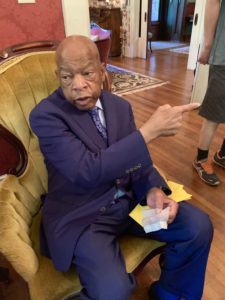
No doubt he had a calming nature. A woman said she was on a plane from Washington to Atlanta with a child that would not stop crying. The seat next to John was empty. John invited the child to sit next to him. Mom said by the time the plane got to Atlanta they both were asleep.
A Congress member representing the Trenton, N.J., area asked John to speak at a church. I left a message on John’s home number I would meet him in the Trenton train station. He got off the train, nodded to the Congressman, put his arm around my shoulder and we walked through the train station as the two buds from Georgia we were. The Jersey Congressman, who I didn’t care for, walked a few feet back, confused at this unexpected turn of events. At the church a young black man and I stood in the back. At such events they want to sing the civil rights anthem “We Shall Overcome” with John. The young man asked if I would sing with him. I could have explained journalists don’t join in. But that would take too long. I took his hand and we sang together. The Congressman who invited John looked at me like he had been dropped into a strange land.
Politicians never were sure what John would do. He didn’t play their games. He did hold a sit-in on the floor of the House of Representatives. He was the youngest speaker at the 1963 March on Washington where Dr. Martin Luther King Jr. gave the “I Have A Dream Speech.” In those days the young John was called a “black militant.” He was non-violent, but he was confrontational. He was insistent, persistent and impatient, thinking equal justice was long overdue. His original speech had to be toned down. Even so, President John Kennedy was not sure if John would upset the apple cart, so he had someone standing by to interrupt John’s speech with a recording of gospel singer Mahalia Jackson if he got too critical.
He was 80 when the struggle here ended. He started protesting injustice when he was a teenager. He saw a Voting Rights law, a Civil Rights law and walked across that bridge with Barack Obama as president. The struggle continues. One of his last public appearances was at Black Lives Matter Plaza near the White House. He called it a strong and powerful message to the world. What a journey.
Those who love and admire him can best show it by continuing the fight in his honor. We Atlantans claim him, Alabama claims him. The country and world claim him. Now he belongs to history. In my imagination I like to think he is reunited with his wife, Lilian, his ancestors, the others who fought the good fight and Dr. King who would say, “The Boy from Troy did well.” He was a Christian in the true sense of the word. But he knew, in the words of JFK’s inaugural, “… here on earth God’s work must truly be our own.”
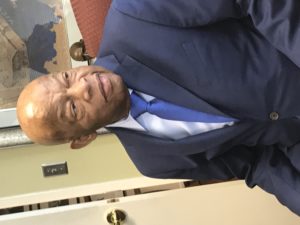
Last time we spoke we were talking about a mutual frustration in politics. I leaned close to his face so that only he could hear and said, “This, too, we shall overcome.” To which he responded, “We shall not be moved.” The last words he spoke to me.

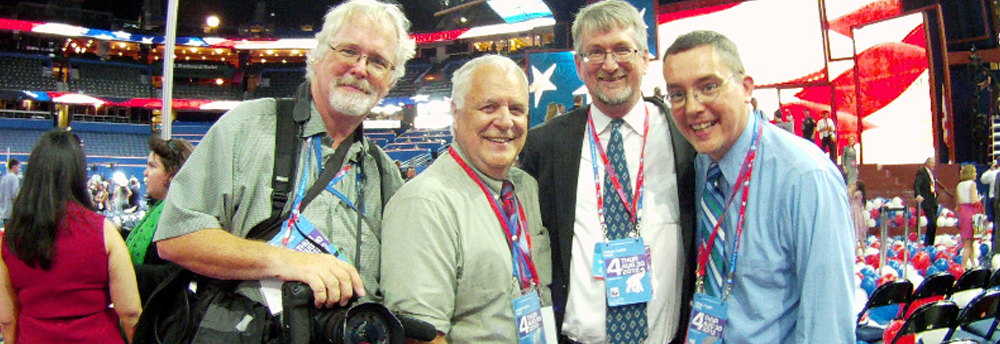
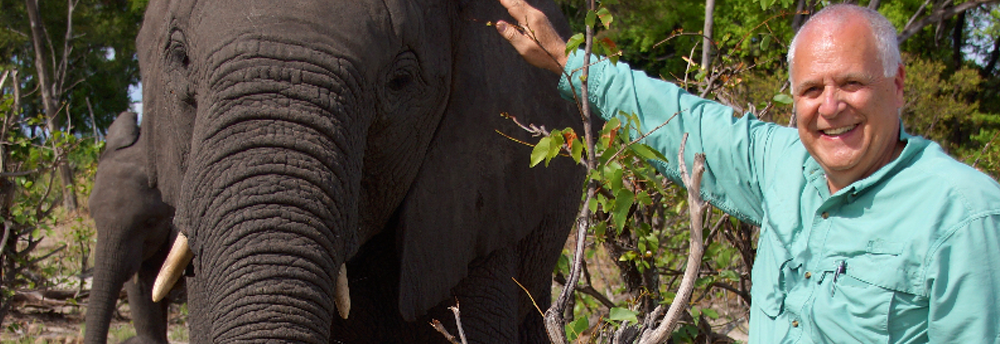


Sorry, comments are closed for this post.